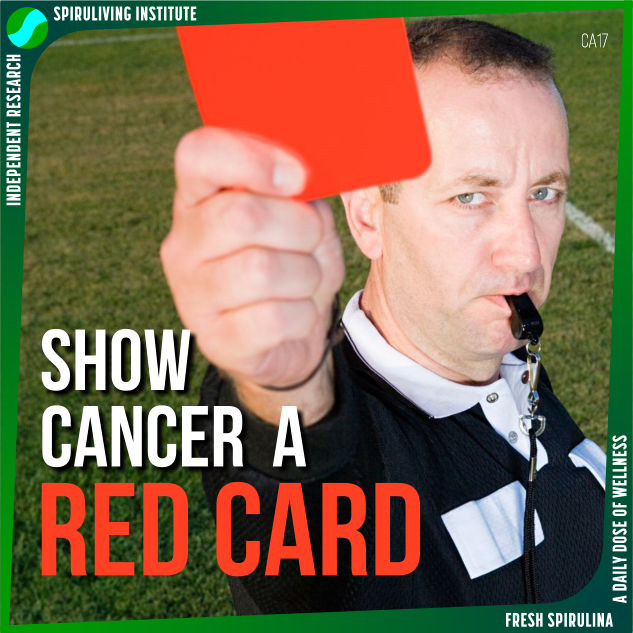
Phycocyanin from Spirulina Shown in 25 Studies to Dramatically Reduce Cancer Tumors within Hours
QUICK SUMMARY
This independent research review studies the effects of phycocyanin from spirulina on various tumor cells.
The results are summarized in this table:

SAFETY
Studies of spirulina have not revealed any toxic effects on kidney, liver, reproductive system, or body physiology during or after the administration of acute or chronic doses.
A review of the United States Pharmacopoeia — 1966 to 2009 PUBMED literature, and a review for adverse event reports of the United States Food and Drug Administration (FDA) concluded that spirulina has a Class A safety rating.
PHYCOCYANIN
This study focused on an ingredient of spirulina: phycocyanin (PC), a blue-red fluorescent, water-soluble and non-toxic biliprotein pigment.
It is an active ingredient of spirulina and was shown to have therapeutic properties, including anti-oxidant, anti-inflammatory, immune-modulatory and anti-cancer activities.
Medical applications of phycocyanin are of interest due to its anti-inflammatory, anti-viral, anti-cancer, immunostimulatory and anti-oxidant properties.
Recent anti-cancer studies of phycocyanin revealed a significant inhibitory effect on the growth of cancer cells.
Multiple mechanisms have been found, including the induction of apoptosis, cell cycle arrest, inhibition of DNA replication and the generation of reactive oxygen species (ROS).
While apoptosis was significantly increased in cancerous cells, phycocyanin had a considerably lower toxicity on cells from healthy tissues, which makes it a candidate for chemotherapeutic applications.
Comments from Spiruliving Institute
This study focuses only on Phycocyanin:
1. Spirulina is a natural and economic substance that would be difficult to patent as a high-profit drug.
2. Phycocyanin is fragile and is damaged by heating to more than 40 degrees centigrade. Learn more here.
3. The studies referenced used dried spirulina that contains less phycocyanin, due to drying and storage, than fresh spirulina.
4. Fresh and fresh-frozen spirulina (never heated never dried) is recently becoming available. This can contain ten times more virgin phycocyanin in addition to a host of other phytonutrients and antioxidants that also show powerful anti-cancer effects. These include beta-carotene, chlorophyl, zeaxanthin, ascorbic acid, in addition to 22 different phenols and 11 different flavonoids.
MOLECULAR MECHANISMS OF PHYCOCYANIN-INDUCED ANTI-CANCER ACTIVITY
Phycocyanin has molecular mechanisms that appear to be effective against many types of cancer cells.
The following anti-cancer mechanisms have been identified, with more still being researched:

ADDING PHYCOCYANIN TO EXISTING CANCER THERAPIES
Research studies confirm that adding phycocyanin to well-established anti-cancer drug treatments could improve cancer therapy significantly.
In this way it may be possible to reduce the dosage of the anti-cancer drugs - which often lead to severe toxic side effects.
EFFECT OF PHYCOCYANIN ON TUMOR CELLS IN COMPARISON TO NON-MALIGNANT CELLS
Phycocyanin from spirulina is toxic to tumor cells but non-toxic to non-malignant cells.
The reasons for this remain the subject of research and discussion.
CONCLUSIONS
The data indicate that phycocyanin from spirulina may be considered a safe drug to reduce or inhibit tumor cell growth.
The combination with other anti-cancer drugs and/or radiation therapy might allow the reduction of the effective dose of established anti-cancer drugs, which would minimize dose-related side effects and improve the therapeutic outcome.
LEARN MORE
Phycocyanin from Arthrospira platensis (Spirulina) as Potential Anti-Cancer Drug: Review of In Vitro and In Vivo Studies
NIH - National Library of Medicine
National Center for Biotechnology Information
LIFE SCIENCE JOURNAL (Basel) 2021
SLI-CA17
Spirulina Topics:





